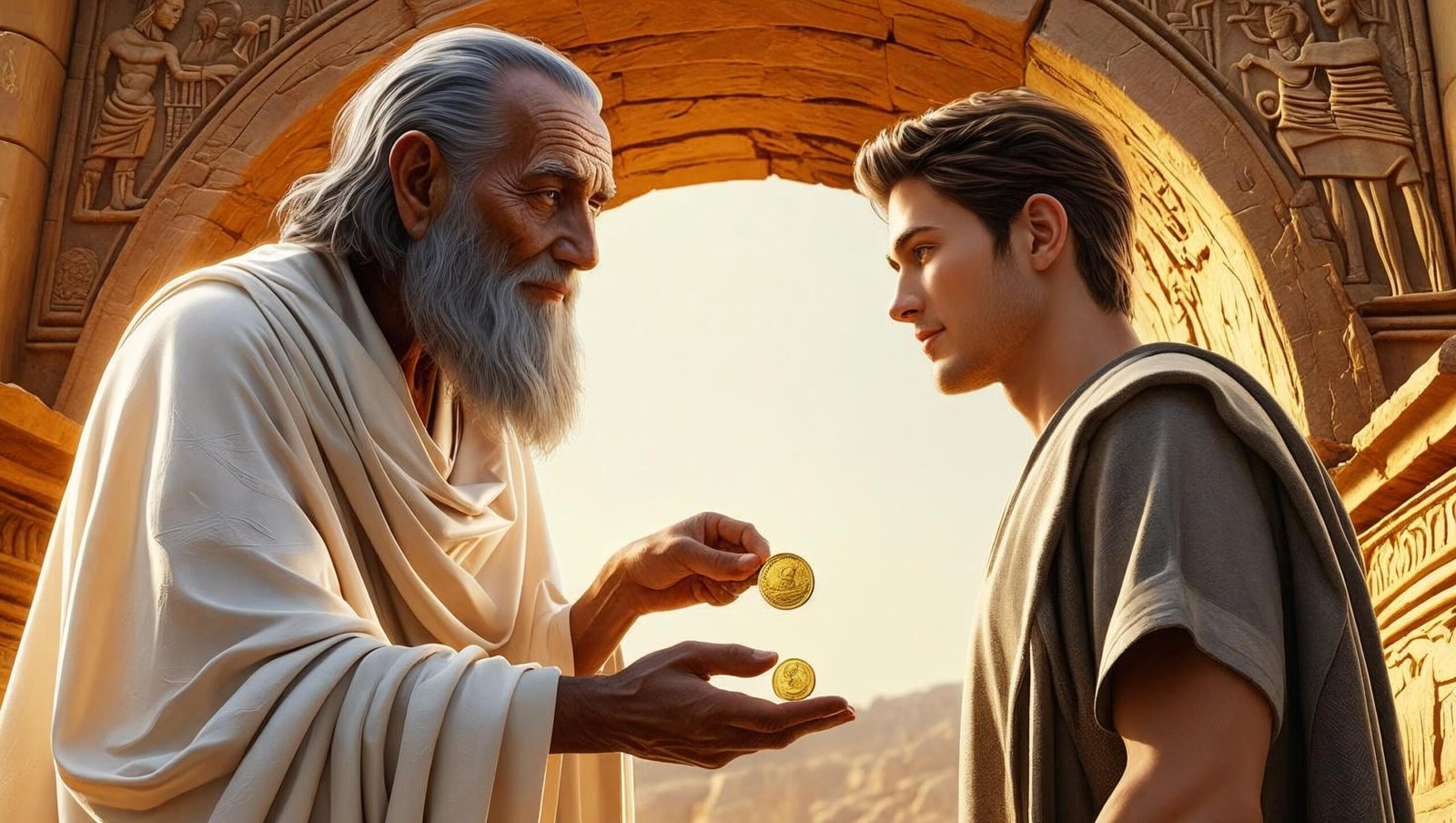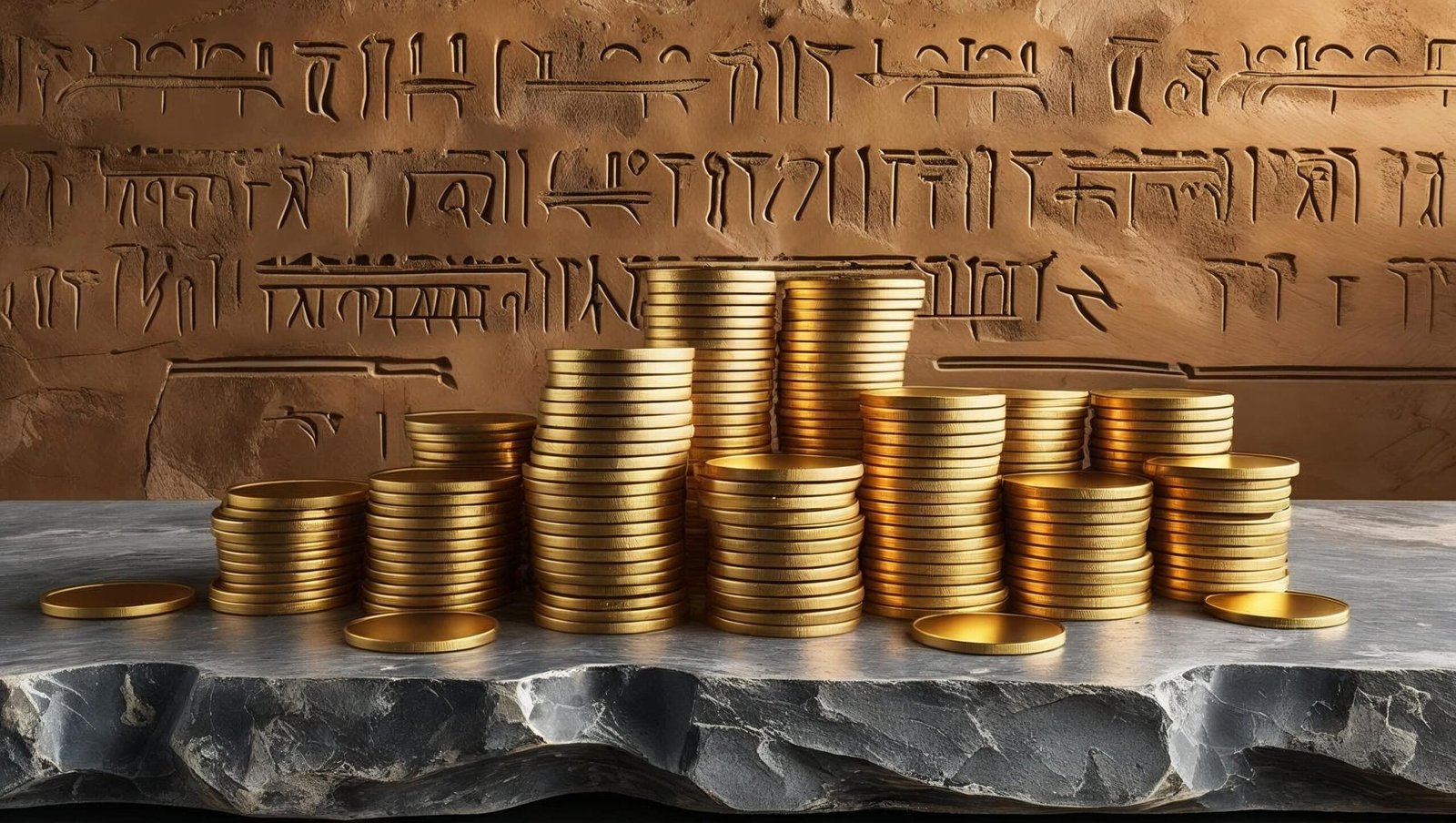Introduction
In a world where financial noise often drowns clarity, few books stand the test of time like The Richest Man in Babylon. This classic work by George Samuel Clason continues to enlighten readers with its ageless principles of wealth and success.
Set in ancient Babylon—once the wealthiest city in the world—The Richest Man in Babylon delivers its wisdom through engaging parables and simple, actionable rules. It’s a book not just to read, but to live by.
This blog post delves into the 7 most life-changing lessons from The Richest Man in Babylon, translating its ancient wisdom into clear guidance for today’s financial world.

1. Pay Yourself First
The foremost principle in The Richest Man in Babylon is to pay yourself first. This means saving at least 10% of every rupee you earn before spending anything else. This is not about being stingy or self-denial, but about self-respect and prioritizing your future.
“A part of all I earn is mine to keep.”
This simple line from The Richest Man in Babylon carries profound meaning. Modern financial advisors echo this very rule in the form of automated savings, emergency funds, and long-term investments. You owe it to yourself to become your first creditor.
2. Control Thy Expenditures
Another core tenet from The Richest Man in Babylon is learning to control your spending. No matter how much money you earn, expenses will always expand unless you manage them with discipline.
Clason teaches us that identifying our needs versus wants is essential. The book’s characters often struggle with indulgences, just like people today. But financial growth begins with conscious control over lifestyle inflation.
Budgeting is not a modern gimmick—it’s an ancient truth, straight from Babylon.
3. Make Your Money Work for You
In The Richest Man in Babylon, saving money is not the end goal. The gold must be put to work to generate more wealth. This lesson is about investing wisely so your money earns while you sleep.
Whether it is real estate, businesses, or modern assets like mutual funds or stocks, the message remains: let your wealth multiply. The story of Arkad, who grows his fortune through smart investments, is the most vivid embodiment of this rule.
Avoid hoarding. Instead, build systems where money breeds money.
4. Guard Against Loss
The Richest Man in Babylon warns explicitly against risky ventures and blind trust. Clason’s parables repeatedly show people losing fortunes due to poor judgment or lack of research.
Today, this lesson applies directly to scams, risky cryptocurrencies, pyramid schemes, and FOMO-based investing. The book advocates for caution, consultation with experts, and ensuring safety of capital.
Remember, the goal is sustainable wealth, not sudden fortune followed by regret.
5. Own Your Home
Homeownership is presented in The Richest Man in Babylon as a pillar of financial freedom. A person who owns their house is more secure and less burdened by rising rents or evictions.
While today’s world offers debates on renting versus buying, the spirit of this lesson is about investing in assets that reduce liabilities. A well-thought real estate investment still serves as a cornerstone for many wealth-builders today.
Even if you begin small, owning tangible assets strengthens financial confidence.
6. Ensure Future Income
Preparing for life’s uncertainties is a major theme in The Richest Man in Babylon. This lesson urges readers to secure their future with planning—through insurance, retirement funds, and secondary income streams.
Arkad suggests creating plans for when earning capacity diminishes with age. This is exactly why modern personal finance emphasizes pension planning, mutual funds, term insurance, and passive income.
Don’t just save for today. Secure your tomorrow—because time is ruthless, and financial foresight is protection.

7. Sharpen Your Skills
The final and perhaps most empowering lesson in The Richest Man in Babylon is to continuously invest in oneself. Arkad didn’t become rich by chance. He learned, failed, tried again, and never stopped growing.
“Increase thy ability to earn.”
This lesson is universal: improve your value, and your income will follow. In modern terms, this means learning new skills, adapting to changing industries, and never becoming professionally stagnant.
Books, online courses, mentorship—these are modern equivalents of Babylonian self-mastery.
The Power of Simplicity in Timeless Wisdom
One of the most powerful things about The Richest Man in Babylon is its simplicity. The book does not offer complex formulas or jargon. Instead, it offers ancient parables with eternal relevance.
Each story, from the humble Arkad to the reckless Dabasir, reflects a different struggle in our financial lives. That’s what makes The Richest Man in Babylon a timeless guide—it doesn’t just instruct, it resonates.
It’s not just a book—it’s a philosophy.
Real-World Applications of Babylonian Wisdom
Today’s economy is vastly different from ancient Babylon. But human behavior? Largely unchanged. The greed, the hope, the fear—it’s all the same. That’s why The Richest Man in Babylon remains relevant:
-
Budgeting apps still follow the “pay yourself first” model
-
SIPs and mutual funds reflect the “make thy gold multiply” doctrine
-
Personal finance coaches still teach “control thy expenditures”
-
Home loans and asset acquisition follow “own thy home” logic
Clason’s wisdom fits into modern frameworks seamlessly. He just said it first—and better.
🔍 Deeper Insights: Why This Book Still Matters Today
In today’s world, people chase financial success through viral trends, overnight schemes, and unpredictable market moves. And yet, amidst all this noise, the quiet, disciplined voice of The Richest Man in Babylon still rings true.
The book is not just about saving money—it’s about reshaping your mindset to think like the wealthy. And real wealth, as the book teaches, is not in the amount of money you possess, but in your understanding of how money works and how to make it serve you.
For example, the book’s advice on “paying yourself first” is echoed in modern financial practices like SIPs (Systematic Investment Plans), Roth IRAs, and 401(k)s. The idea is that consistent saving over time, even in small amounts, creates an unshakable financial base.
Many financial experts such as Dave Ramsey and Ramit Sethi endorse similar ideas, but it’s worth remembering that The Richest Man in Babylon laid down these concepts almost a century ago.

📚 Modern Lessons from Babylonian Parables
The stories in the book, though ancient in setting, address very modern dilemmas. For instance, the tale of Rodan the spearman, who receives a large sum of gold and seeks investment advice, mirrors the experience of someone today receiving a windfall—maybe a bonus, tax refund, or even a small inheritance.
What does Rodan do? Initially, he considers lending it to his sister’s husband to start a business—a well-meaning but ill-advised decision. Instead, he receives counsel to only lend or invest with people who have demonstrated knowledge and experience in their field.
This story alone could save modern readers from countless bad investment decisions. The lesson is timeless: don’t risk your gold with amateurs.
💼 Application in Professional Life
The Richest Man in Babylon is often discussed in the context of personal finance, but its lessons are just as powerful in the professional realm.
Take the principle “Increase thy ability to earn.” This is not only about acquiring more jobs or clients—it’s about making yourself irreplaceable, upskilling, and becoming so good they can’t ignore you.
In a modern sense, this might mean learning a new software skill, building a personal brand, networking strategically, or investing in a side hustle. Whatever the path, the idea is the same: the more value you offer, the more wealth you’ll attract.
In fact, one can say that self-improvement is the most valuable investment, and The Richest Man in Babylon insists on it repeatedly.
🌍 Cultural & Historical Appeal
Another reason The Richest Man in Babylon remains beloved is its cultural allure. Babylon, the fabled city of gold and grandeur, provides a rich backdrop that elevates the book beyond a boring finance manual. There’s history, mythology, storytelling—all tied into practical life advice.
Readers don’t feel lectured. Instead, they feel entertained, almost enchanted, as they absorb crucial knowledge.
Arkad, the central character, is not presented as flawless or born into wealth. He is a relatable figure—someone who learned through trial and error, took risks, lost money, but never gave up on his dream of becoming wealthy. His journey is the journey of every reader who wants more from life.
🧠 Psychological Impact of Reading This Book
Beyond money, the psychological shift that The Richest Man in Babylon triggers in readers is profound. It replaces fear with confidence. Confusion with clarity.
Many people avoid money topics due to shame or past mistakes. But this book breaks that taboo. It says: “Yes, you’ve failed. But you can begin again—wiser this time.”
Financial transformation doesn’t require perfection. It requires direction, and The Richest Man in Babylon offers just that. Each parable becomes a stepping stone on the path to personal redemption and financial discipline.

💬 What Financial Gurus Say
Even popular financial educators recommend this book. Robert Kiyosaki, author of Rich Dad Poor Dad, has called it “a mandatory read for anyone serious about wealth.” The simplicity and storytelling of the book often make a stronger impression than technical textbooks or complex investment strategies.
Warren Buffett, known for his frugal and long-term approach, echoes many of the same values that this book promotes: patience, compounding, risk awareness, and humility.
If the richest minds in the modern world revere the teachings of The Richest Man in Babylon, it reinforces the fact that the book is not just good—it’s legendary.
📈 Investing for Beginners: Babylonian Style
Most new investors feel overwhelmed. Stocks, mutual funds, crypto—it’s a dizzying world. But The Richest Man in Babylon simplifies this chaos with a few universal truths:
-
Start early and be consistent
-
Never invest in things you don’t understand
-
Reinvest the returns
-
Protect the principal
These are principles anyone can follow, whether they’re investing ₹500 or ₹5 lakhs. The book demystifies wealth creation by showing that clarity and consistency beat complexity and cleverness.
🔐 Hidden Gems Most Readers Miss
Though most readers focus on Arkad’s seven cures for a lean purse, The Richest Man in Babylon has other hidden gems:
-
On debt: The book treats debt like a dangerous enemy—not evil, but very tricky. It encourages readers to get out of debt through disciplined repayment, not shortcuts.
-
On generosity: Arkad speaks about enjoying your wealth, sharing it, and contributing to the good of others. It’s not about hoarding, but about purposeful abundance.
-
On character: Wealth without integrity is hollow. The book consistently reinforces that character, trust, and honour are essential qualities in long-term prosperity.
🌱 Encouragement for the Beginner
It’s important to note that The Richest Man in Babylon is especially encouraging for beginners. It doesn’t shame you for not knowing. Instead, it welcomes you into a circle of wisdom with warmth and clarity.
You don’t need a finance degree. You don’t need a big salary. All you need is discipline, consistency, and belief that you can change your financial future.
🌟 The Universal Relevance of Ancient Financial Wisdom
In an era dominated by fast-paced digital transactions, cryptocurrency volatility, and algorithmic trading, it’s easy to forget that the principles guiding sound financial behavior haven’t really changed. What worked a thousand years ago continues to prove effective today—provided we are willing to apply it with discipline and patience.
One of the most striking aspects of timeless financial principles is their adaptability. Whether someone is an entrepreneur, a student, a salaried employee, or a freelancer, these lessons offer guidance. They encourage budgeting with intention, delaying gratification, and thinking long-term rather than chasing instant rewards.
More importantly, such ideas foster financial independence—an outcome many desire but few achieve due to lack of planning or awareness. By cultivating habits like regular saving, wise investing, and prudent spending, even someone with limited income can begin to create security and freedom.
Additionally, these teachings instill emotional stability. When people understand the value of every coin earned and spent, they become more mindful, less reactive to market hysteria, and far more empowered to make calm, informed decisions.
This approach doesn’t require modern tools or advanced education. What it requires is consistency. Tenacity. The quiet determination to improve one’s situation day by day, rupee by rupee, regardless of where you start.
In this sense, financial wisdom isn’t just about amassing money—it’s about building character. It nurtures patience, resilience, foresight, and self-respect. These traits, once developed, positively influence all other aspects of life—from relationships to careers to mental well-being.
Ultimately, it’s not about chasing wealth for its own sake, but learning how to manage resources in a way that brings both peace of mind and enduring prosperity.

📌 Final Thought Before You Start the Book
If you’re someone who’s always felt money is complicated, confusing, or out of reach—then The Richest Man in Babylon will be like a long-lost mentor finally showing you the map.
The stories, though ancient, are reflections of today’s real-world challenges. And the solutions they offer? Pure gold—both figuratively and literally.
Frequently Asked Questions (FAQs)
Q1: What is the main message of The Richest Man in Babylon?
A: The book teaches time-tested principles of personal finance such as saving regularly, avoiding debt, investing wisely, and consistently improving one’s skills.
Q2: Is The Richest Man in Babylon still relevant today?
A: Absolutely. Although written in 1926, the book’s principles are timeless and apply perfectly in modern-day financial planning and personal development.
Q3: Who should read The Richest Man in Babylon?
A: Anyone aiming for financial independence—students, salaried professionals, entrepreneurs, and even retirees—will benefit from its straightforward teachings.
Q4: Is the language difficult to understand?
A: The book uses slightly archaic English to reflect the Babylonian setting, but modern editions often simplify it for new readers. Its parables are easy to grasp.
Q5: How long does it take to read The Richest Man in Babylon?
A: It can be completed in 4–6 hours, but the wisdom it imparts can last a lifetime if implemented earnestly.
🔁 Conclusion
The Richest Man in Babylon is more than a financial guide—it is a life guide disguised as a set of ancient tales. It teaches that no matter your background, income, or age, you have the power to rewrite your financial story.
The timeless parables teach more than money—they teach discipline, foresight, and wisdom. And above all, they teach self-belief.
So if you are serious about creating a better financial future, stop looking for shortcuts and start embracing fundamentals. Let The Richest Man in Babylon be your guide, your coach, and your compass.
Read it once. Apply it forever.
📎 Let’s Continue the Conversation
Have you read The Richest Man in Babylon? Which lesson hit you the hardest? Did any parable mirror your real-life experience?
Drop your thoughts in the comments at:
👉 shubhanshuinsights.com
Let’s build a community of readers who don’t just read—but grow.
True financial freedom is built slowly, through wise habits, self-discipline, and learning. Stay committed, and wealth will follow over time.